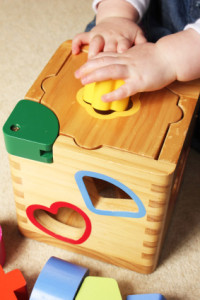 “Play” is a child’s work. Development of play skills is an essential component of early child development. Play acts as a window which allows us to examine all aspects of a child’s development including their physical, cognitive, speech and language and social-emotional functioning. It is through play that children learn about objects, people and the environment around them. Play also creates contexts to support bonding and social connectedness with others. As with other areas of development, play skills develop sequentially, changing and expanding as children progress from the stages of infancy through preschool. It is not surprising that as a child’s motor, cognitive and language skills grow, their play becomes more complex and sophisticated. It seems simple enough right? It might be for typically developing children but for children with special needs, play skills are often deficient due to motoric, cognitive, linguistic and other challenges.
“Play” is a child’s work. Development of play skills is an essential component of early child development. Play acts as a window which allows us to examine all aspects of a child’s development including their physical, cognitive, speech and language and social-emotional functioning. It is through play that children learn about objects, people and the environment around them. Play also creates contexts to support bonding and social connectedness with others. As with other areas of development, play skills develop sequentially, changing and expanding as children progress from the stages of infancy through preschool. It is not surprising that as a child’s motor, cognitive and language skills grow, their play becomes more complex and sophisticated. It seems simple enough right? It might be for typically developing children but for children with special needs, play skills are often deficient due to motoric, cognitive, linguistic and other challenges.
Parents and caregivers often ask, “What can I do with my child at home to help them talk more?” The response to this question is simple: “Get down on the floor and play with your child!” Getting down on your child’s level is essential as it allows you to enter their world. Here are some useful tips on how to “play” with your child:
- Select toys that are developmentally appropriate for your child. It is important to consider your child’s cognitive, language and motor skills when selecting toys. A child might be 5 chronologically but functioning on a lower level in one or more areas. Toys that are too high level might be frustrating. Toys that are too low level, may not be challenging or stimulating enough.
- Choose toys that present numerous opportunities for language learning. Toy farms, doll houses, kitchens, cars and race ramps, trains, baby dolls, puzzles etc. are all great choices to enhance language development. Numerous linguistic concepts can be targeted through play with these toys including labeling objects, spatial concepts (in, on, under, up, down); attributes (big/little, colors, fast/slow), pronouns (he/she, it, they, etc.)
- Provide language input that is just above where your child is currently functioning. For example, if your child is nonverbal, provide language input in single words to two words (“open,” “open door”). As your child becomes increasingly verbal, model utterances that subtly increase in length and complexity.
- Enhance social skills. While engaged in play with your child, make eye contact with your child and have them look at you. Practice simple turn-taking by saying “My turn,” “Your turn” etc.
- When in doubt, choose a book! Books are a great way to bond with your child and improve language development. Create a context where your child sits in your lap or next to you to read together. Label pictures of objects or favorite characters in the book. Talk about what the characters are doing. Ask simple questions about the story. Allow children to turn the pages as you read together.
- Take Play outside! Play with your child outside at the park or in the backyard. Work their gross and fine motor skills and target language skills at the same time. Model or have your child talk about what they or others are doing (e.g. “Mommy up”, ‘I jump” “I go down” etc.)
- Have fun!!! Children will pick up on cues from the way you interact with them. If you are having fun, chances are they are having fun too! Change your voice when reading to talk like characters; do silly things on purpose to elicit reactions, make silly faces.
As electronic “toys” become an ever increasing part of our lives, it is important to limit your child’s “play” with cell phones, tablets and other electronic devices. When it comes to improving your child’s development, there is no game or App that can replace face to face hands-on play experiences! We must not lose sight that for young children, both typically developing and those with needs, good old-fashioned interactive toys are still the best choices parents can make to enhance their child’s development. At ChildsPlay Therapy Center, our staff of outstanding therapists understand the importance of play skills in a child’s development and will select therapeutic materials to support these skills. Our therapists will also help parents select appropriate play materials to enhance carryover of skills to the home environment.
By Allyson Pasternack, ChildsPlay Therapy Center

